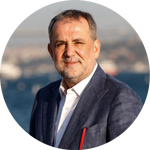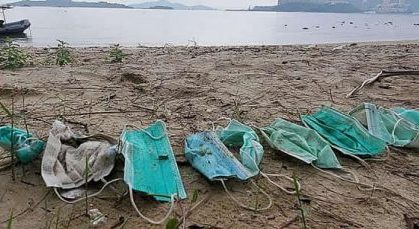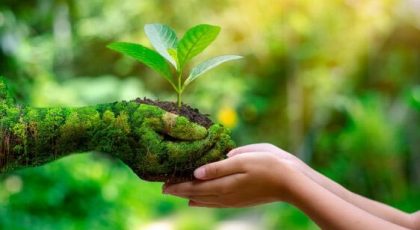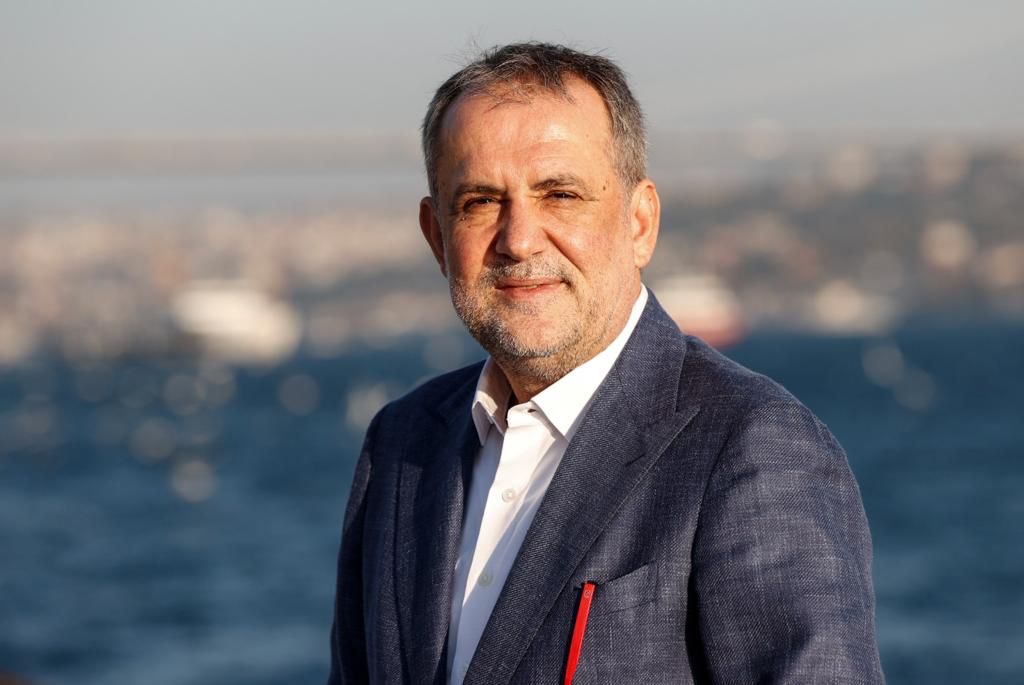The annual global extraction of resources has skyrocketed to 92 billion tons from 27 billion tons over the past five decades, exceeding the pace of nature’s self-renewal and causing almost irreparable destruction to the planet.
Climate change, air pollution, garbage patches in oceans, garbage dumps on land and more than a million species facing extinction are just some of the problems that need to be addressed.
Another problem that is the result of the natural balance being disturbed by human beings is outbreaks, frequently seen in recent years, with health-related, economic and social impacts on millions of people.
One of these plagues is zoonosis, infectious diseases that jump from animals to humans, an example of which was seen in 14th century Europe with the bubonic plague, which caused about 200 million deaths, according to some research.
The Spanish flu, which broke out in the U.S. during World War I, spread rapidly among nations that interacted with each other because of the war. As one of the worst global pandemics, the Spanish flu affected 500 million people, corresponding to one-third of the world’s population at the time, and caused more than 50 million deaths.
History repeats itself
A century later, the world is again in the grip of a pandemic that broke out in Wuhan, the capital of the Chinese province of Hubei and a city of industry, trade and technology, in late 2019, growing into a pandemic transmitted from human to human.
The World Health Organization (WHO) identified the outbreak as COVID-19. Although it was less lethal compared to other recent outbreaks of Ebola, MERS and SARS, its effects have been devastating.
This is because it can be transmitted from one person to another even without the infector exhibiting symptoms. Unlike many other diseases, it has almost no effect on children. In this way, it becomes easier to spread through asymptomatic carriers. It affects elderly people with preexisting conditions, in particular, triggering aggressive infections and causing loss of life.
Its rapid spread and greater impact on the elderly deeply affected the health systems of many developed countries, such as Iran, Italy, Spain and the U.S.
As a result, intensive care units were quickly flooded with critically ill patients. In many countries, patients were treated in corridors and gardens, while in some countries, unfortunately, only the treatable received attention. This led to the collapse of many nations’ health systems. As such, radical measures were inevitable.
The outbreak crisis
The outbreak in China was curbed before spreading widely across the country.
However, the measures taken were very unusual. The most effective way to prevent the spread of the outbreak was to reduce the contagion. For this reason, more than 60 million people were quarantined for weeks. Streets, roads, shopping malls, schools, places of worship, entertainment venues, countryside, beaches and wherever you can think of were empty.
Lockdowns then went into effect in Europe as the epicenter of the pandemic moved to Italy.
These lockdowns both in tourism and major financial centers in France, Belgium, the U.K., Germany and the Netherlands, as well as in Italy, brought Europe to a standstill.
In a world where borders have almost been erased, it was inevitable that such an outbreak would spread rapidly, and in the ensuing process, the new epicenter of the pandemic became the superpower of the world, the U.S.
The U.S. administration first proposed the idea of herd immunity to avoid an impact on economic activity. Since the elderly population was severely affected, health organizations were soon overburdened.
This necessitated stricter measures and forced the lockdown of about 300 million people, corresponding to 90% of the country’s population, in mid-April.
With the introduction of a lockdown in India, the most populous country in the world with a population of 1.3 billion, the number of people quarantined in late March around the world soared from 1.7 billion to 3.9 billion, which corresponds to half of the world’s population.
On March 11, Turkey confirmed the first coronavirus case in the country and immediately implemented a raft of measures to prevent the spread of the pandemic.
Many measures such as the closure of schools, a remote flexible working model, the closure of shopping malls and entertainment venues, the suspension of sports activities and intercity travel restrictions were implemented early on to avoid the adversities seen in countries such as Italy, Spain and the U.S.
Standstill
The world has come to a standstill with the outbreak of the coronavirus. Giant metropolises such as Tokyo, with a population of 38 million, Delhi, with a population of 28 million, New York, with a population of 21 million, Moscow, with a population of 16 million, and London, with a population of 12 million, which once experienced floods of people in their streets, almost turned into ghost cities, according to the United Nations Human Settlements Programme (U.N.-Habitat).
When people were confined to their homes worldwide, consumption decreased and production slowed. Factories cut back on their operations. Sports competitions, and culture and art events were canceled.
The Olympic Games, held regularly every four years since 1896, were canceled for the first time since the world wars.
As a result of all of these developments, transportation activities declined. According to the International Civil Aviation Organization (ICAO) estimates, air transport, the fastest type of transport today, decreased by 60%-95%. The sky was left to its true owners, the birds.
Likewise, tourism activities stalled. According to the United Nations World Tourism Organization (UNWTO) estimates, travel restrictions were imposed on about 96% of tourism centers around the world.
Certainly, with the coronavirus outbreak, the world has lapsed into silence. Transportation has stopped. Tourist attractions and megacities that were previously bursting at the seams have almost turned into ghost towns.
While it only impacted the economy at first, the prolonged pandemic has also had sociological, psychological and environmental implications.
In addition to the negative effects on the environment and natural balance, the process also produced some positive results. Our worn-out world has been able to breathe for a moment. The world has slowed down. Cities where life used to continue 24/7 almost became slow cities and consumption decreased. Our weather has improved. The waters have become clearer.
Many measures, including travel restrictions, the remote flexible working model and the closure of schools in order to contain the pandemic have also slowed transportation. Mobility decreased by 90%.
This affected air quality the most. There have been noticeable improvements in air pollution, which claims about 8 million lives worldwide each year.
Especially in countries such as China and India, where people cannot go out without a mask even in normal times in winter, the sky has turned blue once again.
The resulting opportunities to see the Himalayan peaks with the naked eye from Kashmir at a distance of 200 kilometers (125 miles), Mount Uludağ from Istanbul at a distance of 180 kilometers, and the peak of Mount Elbrus, the highest point in Europe and Russia, from the town of Arhavi in Turkey’s northeastern Artvin province, at a distance of 240 kilometers, were also obvious results of this improvement.
As a result of a 50% decline in land transport and at least 60% in air transport, the levels of nitrogen dioxide, a kind of pollution caused by transport, fell considerably.
According to the assessments of the European Space Agency (ESA) and U.S. National Aeronautics and Space Administration (NASA), nitrogen dioxide pollution declined by at least 30% in countries such as China, Italy and the U.S.
In some places in China, the decline in air pollution reached 50% when strict measures were taken in January and February. This represented the prevention of the loss of 77,000 lives stemming from air pollution.
Likewise, it is estimated that air pollution fell by around 45% in Spain’s Madrid, one of the worst-hit European cities, and 39% in the U.S. compared to the average of the last four years – which is considered to be the biggest-ever decline in history.
According to a report released by The Guardian, the U.K. experienced a 73% fall in road traffic on March 29. This is the same road traffic intensity as in the year 1955 when there were just a few motor vehicles on the roads.
The same is true for our country as well. The Ministry of Environment and Urban Planning assessed the impact on air quality of outbreak control measures, including curfews in 30 metropolises and the Black Sea province of Zonguldak, and a model was developed accordingly.
These cities are home to more than 60 million people, corresponding to 75% of the country’s population, and host more than 19 million motor vehicles, corresponding to 83% of the registered cars in the country. As a result of the measures, air pollutants were reduced by 85%.
Another upside of reduced transport was the reduction in road accidents. Major road accidents declined by 5% in this period in our country compared to the same period last year – which both helped prevent deaths and reduce insurance costs.
Beware of waste
The use of single-use plastics, masks and gloves has drastically increased amid the pandemic. In particular, masks and other protective materials need to be disposed of safely.
While many countries failed in this, our country took early steps under the leadership of the Ministry of Environment and Urban Planning, and a circular was issued accordingly.
As per Circular No. 2020/12 signed by Environment and Urban Planning Minister Murat Kurum, waste collected from houses, workplaces and health institutions is safely disposed.
In particular, the decline in industrial activity and the stagnation in the food, beverage, service and entertainment sectors around the world has been an opportunity for water resources to renew themselves.
During the lockdown, 10% of wastewater discharge was prevented as a result of the cessation of industrial activity. In southern Asia, a relative improvement was observed in the Ganges, one of the dirtiest rivers in the world due to industrial wastewater discharge. The Indian administration had spent millions of dollars on the river but had seen almost no improvement prior to the pandemic.
Venice, the city of canals, once free of gondolas, boats and ferries, began to regenerate itself ecologically. Wildlife returned to the area. After a yearslong absence, the visit of dolphins delighted the local community.
Safer drinking water
The process of chlorination of drinking water against the risk of all kinds of microorganisms eliminates the threat of coronavirus transmission through drinking water since it is an enveloped virus with a fragile outer membrane.
Such viruses are sensitive to oxidants such as chlorine. So far, studies conducted on a national and global basis have not detected the presence of the coronavirus in drinking water.
The possibility of the coronavirus surviving in wastewater is still being investigated. In our country, studies in this area are carried out under the leadership of the Turkish Water Institute (SUEN).
However, any possible risk should be avoided since the water is eventually released into the environment, including seas and rivers, after purification.
Since water resources are gradually decreasing, it is important to disinfect wastewater in cases where it is treated and reused. Water resources are becoming rarer, and ours is a water-poor country.
In order to use water resources more effectively and efficiently, treated wastewater is reused in the irrigation of green spaces and in industry. It is therefore important to disinfect water before use.
Turkey’s seas also got a welcomed reprieve. The near cessation of sea transportation and the reduction of industrial wastewater discharge allowed our waters to return to their essence for a moment. Dolphins arriving on the shores of Istanbul were also an indicator of this.
After the cessation of tourism activities, the decline in transportation and production, and prolonged lockdowns, nature was partially freed from human influence. Seas, beaches, coasts and city centers have been flooded with native wildlife.
Sea turtles were easily able to lay their eggs on shores thanks to the lack of human mobility and light pollution.
There is a miraculous balance in nature, like the carbon cycle and the water cycle. Everything needs to be interconnected for the continuation of life. We should not upset the balance.
For instance, if you destroy wolves in an ecosystem just for their fur, you break the food chain there, causing another species, such as deer, to overpopulate and damage the environment. Remember the miraculous changes that occurred in the last century when wolves were released back into nature in Yellowstone National Park, the world’s first national park.
We keep on saying “environmental issues are preventive health care.” What underlies the current coronavirus case is the violation of a kind of balance since viruses usually live in moist woodlands and also use wild animals as hosts.
The gradual destruction of forests, the wild animal trade and the intervention in habitats lead to the transmission of viruses to humans in some way. So, we should not break the delicate balance in nature and must act in harmony with it.
New normal, order
Many events in history have accompanied new orders. For instance, the plague that occurred in the 14th century laid the foundations of today’s Europe.
Likewise, in the aftermath of the 9/11 attacks on the World Trade Center in the U.S., the understanding of security in the world changed and was settled on a different ground.
Again, the great Marmara earthquake in Turkey, which occurred on Aug. 17, 1999, and still continues to tear our hearts out, showed the importance of earthquake-resistant housing in our country and pushed the government to take steps in this direction.
This process seems temporary, though. It is up to us to make it permanent. In fact, this process shows the damage we have done to our world, to our resources and to the existing natural balance. Learning a lesson from this, we must create permanent solutions, change some of our habits and change ourselves. We must pioneer the change.
We need to make our cities more livable. We have to put social distancing at the center of our lives. We should support environmentally friendly and healthy activities such as walking and bicycle use, and make plans accordingly. We have achieved this much in this process. Why not continue?
Let us not forget that we have that power and will.
*Deputy minister of the Republic of Turkey’s Ministry of Environment and Urbanization, chief climate change envoy.




